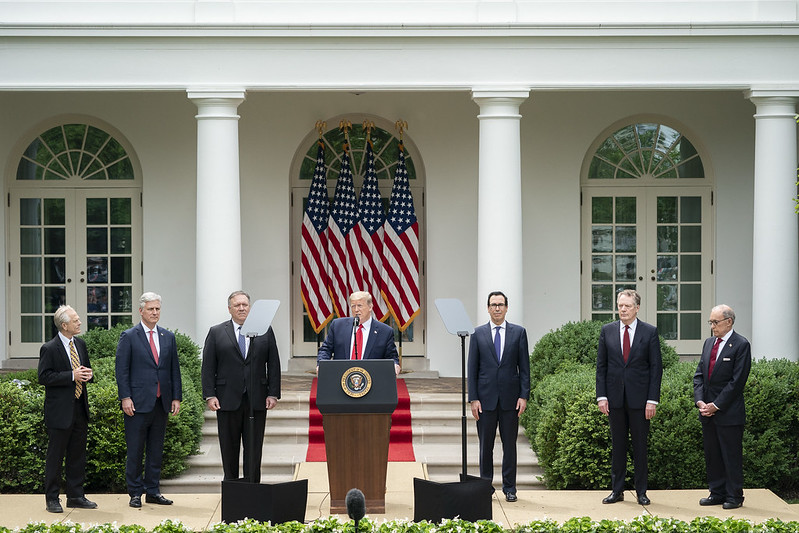Trump Revokes Hong Kong’s Special Status; China Pushes to Win Global Tech Race
Lawfare's biweekly roundup of U.S.-China technology policy news.

Published by The Lawfare Institute
in Cooperation With

After China Passes National Security Legislation, Trump to Revoke Hong Kong’s Special Status, Among Other Measures
On May 29, President Trump announced that he would direct his administration to “[eliminate] policy exemptions that give Hong Kong … special treatment” under U.S. law. On May 28, China’s National People’s Congress (NPC) passed national security legislation that would allow Chinese security agencies to operate in Hong Kong and thereby significantly diminish the autonomy Hong Kong has enjoyed under the “one country, two systems” governance model. In response to the legislation, the president said his announcement “will affect the full range of agreements we have with Hong Kong, from our extradition treaty to our export controls on dual-use technologies and more, with few exceptions.” During the same press conference, Trump also announced that the United States would pull out of the World Health Organization because of China’s influence within the group, and that the United States would stop granting student visas to Chinese nationals with affiliations to the People’s Liberation Army.
The president’s announcement represents a significant break from long-standing U.S. policy toward Hong Kong. The United States has treated Hong Kong as distinct from the Chinese mainland under the Hong Kong Policy Act of 1992, which grants privileges to the former British colony in domains including export controls, customs and immigration. The act also gives the president authority to end Hong Kong’s special treatment if he or she believes “Hong Kong is not sufficiently autonomous” from mainland China “to justify treatment under a particular law of the United States.” The president’s announcement has created concern for international businesses operating in Hong Kong, which has thrived as a commercial hub in part because of the city’s largely independent legal system. But some analysts note that the direct impact of eliminating Hong Kong’s exemptions from tariffs applied to mainland China will likely have only a small impact on the city’s economy, which runs primarily on services.
Beijing has responded with sharp rhetoric but thus far has stopped short of concrete countermeasures. On June 1, Zhao Lijian, a Chinese Foreign Ministry spokesperson said, “Any words and deeds from the United States that harm the interests of China will be resolutely counterattacked by the Chinese side.” He added that “[t]he United States’ attempt to obstruct China’s development and growth is doomed to fail.” Meanwhile, on Twitter, Foreign Ministry spokesperson Hua Chunying responded to a U.S. official who criticized Beijing’s dealings with Hong Kong by tweeting the words “I can’t breathe.” Hua’s remark was an apparent reference to the last words uttered by George Floyd, an African American man whose death at the hands of police in Minneapolis has sparked outrage and confrontations between protestors and law enforcement in cities throughout the United States. Carrie Lam, Hong Kong’s chief executive—who supports the NPC’s national security legislation and is widely seen as pro-Beijing—claimed the United States has shown a double standard in criticizing China’s efforts to bring protests under control. “There are riots in the United States and we see how local governments reacted. And then in Hong Kong, when we had similar riots, we saw what position they adopted,” she said.
In Hong Kong, protests erupted last week in response to Beijing’s national security legislation. But analysts say that the decentralized pro-democracy movement is now struggling to identify a coherent vision for the city’s future: As Hong Kong finds itself caught in the tumultuous U.S.-China relationship and with little hope of repealing Beijing’s national security law, the protesters’ goal of maintaining significant autonomy from Beijing seems increasingly imperiled.
China Announces $1.4 Trillion in Tech Infrastructure Investments
China on May 22 announced plans to invest $1.4 trillion in technology infrastructure through 2025—including more than $400 billion this year. Part of the NPC Work Report, the plan calls for heavy investment—from both regional governments and private companies—in areas including 5G infrastructure, artificial intelligence, data centers, surveillance technologies and cloud computing. It is widely seen as an acceleration of China’s efforts to overtake the United States as a global leader in key technology sectors. The report’s release overlapped with China’s annual NPC meeting, which is considered the country’s biggest political event of the year. Chinese leadership traditionally lays out its policy agenda at this meeting, and officials this year stressed the importance of boosting infrastructure spending focused on new technologies.
It is not yet clear to what extent the investment blueprint will accelerate the pace of China’s technological development. Commentators have cautioned that it includes some previously announced commitments and, even if fully implemented, represents a smaller investment increase than the large headline figures suggest. The centrally approved projects amount to an estimated 10 percent of China’s technology-infrastructure spending and 3 percent of its total fixed-asset investment. Regardless, China’s bold proposal is a significant rallying cry to marshal the country’s resources around technological development. “Nothing like this has happened before,” commented one Hong Kong tech executive, calling the plan “China’s gambit to win the global tech race.” And the government’s spotlight on tech will likely draw substantial private capital, which has recently flowed rapidly into Chinese tech companies.
The investment blueprint reflects, and will likely reinforce, a widening rift between the United States and China on technology-related economic and security issues. Speaking at last month’s NPC meeting, Chinese Foreign Minister Wang Yi used the phrase “new Cold War” when discussing the current state of the U.S.-China relationship. That mention was the minister’s first public use of the term. The focus on domestic investment also highlights China’s related desire to achieve technological self-sufficiency, as the $1.4 trillion package is aimed partly at replacing foreign-made tech with domestic alternatives. Technological self-sufficiency has been a goal of Chinese leadership at least since the 2015 launch of “Made in China 2025,” a 10-year plan to promote domestic manufacturing.
This year, with the U.S. ratcheting up its prohibitions on technology sales to China, Beijing’s emphasis on technological self-sufficiency has grown significantly stronger. Just last month, the Trump administration restricted Huawei’s purchases of semiconductors that employ U.S. technology—regardless of manufacturing location. The new rule closes a loophole by which some companies, such as Taiwan Semiconductor Manufacturing Company (TSMC), were able to supply Huawei with semiconductors produced mostly outside the United States. Unlike Trump’s decision to place Huawei on a trade blacklist in 2019, this restriction appears poised to cause Huawei significant strain. The company’s chairman recently described the new rule as putting its “survival” at stake. To make matters more difficult for Huawei, TSMC announced last May that it would open a new semiconductor plant in Arizona—a move that may signify closer ties with the United States and distancing from China. All these developments have only increased China’s sense of urgency surrounding technological self-sufficiency. China, as a result, has already taken steps to reduce certain sectors’ reliance on technology imports.
China’s proposal also coincides with recent investment announcements from prominent Chinese tech companies, indicating broad-based buy-in to the government’s push. On May 26, Tencent, the tech giant that operates China’s WeChat platform, announced it would invest $70 billion in digital infrastructure over the next five years. The investments will focus on artificial intelligence; cloud computing; blockchain; and infrastructure to support 5G, data centers and advanced servers. Alibaba, meanwhile, disclosed plans in April to invest $28 billion in cloud computing over the next three years. Around the time of the NPC meeting, it also committed to $1.4 billion of new investments into artificial intelligence and the “internet of things.” Provincial and local governments have responded, too. Shanghai’s government recently pledged to speed up its development of 5G networks and build 3,900 new 5G base stations.
News of China’s technology-investment push has drawn mixed reactions from Western commentators. Some see the proposal as a sign that China is progressing quickly on its journey toward global tech leadership. Others are skeptical that the plan will have a significant impact on innovation or productivity. Still other analysts have cast doubt on whether China can deliver on some of its blueprint’s specific goals, including by creating enough demand for certain products that it is accelerating. Despite debate over the investment plan’s prospects, however, many commentators in the United States have used its launch to call for renewing American investment in infrastructure and technology.
Other News
U.K. Prime Minister Boris Johnson has soured on Huawei and called for a coalition of democratic nations to counter the company. Sources reported on May 23 that Johnson reversed his decision to let Huawei take part in building Britain’s 5G network. Earlier this year, Johnson had approved Huawei to supply the United Kingdom with nonsensitive 5G equipment, with its market share limited to 35 percent. At the end of May, the Johnson administration also proposed the creation of a “D10” club: an alliance of 10 democratic nations that would collaborate on producing 5G and other sensitive technologies. The objective of such collaboration would be to obviate the need for countries to rely on Huawei or other Chinese producers to provide these products. Such cooperation would be a break from the past; commentators have widely considered the lack of democratic-country cooperation regarding 5G to be a “striking failure.” Johnson’s D10 would include the G-7 countries—the United States, Canada, France, Germany, Italy, Japan and the United Kingdom—as well as Australia, India and South Korea. (Shortly after Britain’s proposal was released, President Trump postponed this month’s G-7 meeting and suggested inviting the latter three countries, plus Russia.) The Johnson administration’s about-face on Huawei came after concerns emerged regarding China’s nontransparent handling of the coronavirus. Johnson’s earlier stance toward Huawei drew harsh criticism from the United States, and his reversal will likely improve U.S.-U.K. relations. China, by contrast, has condemned the move, with the editorial board of the state-run China Daily warning that the United Kingdom’s reversal would be “very costly.” Huawei officials are reportedly holding last-minute talks with Johnson’s aides over the decision.
On May 29, Trump signed an executive order banning certain Chinese students with links to China’s military from entering the United States on visas for graduate study. Specifically, the measure covers any student who has an “association” with a Chinese entity supporting China’s “civil-military fusion strategy.” China’s civil-military fusion is generally understood as the elimination of barriers between its defense and civilian sectors, such that the Chinese military can leverage private-sector research. Trump’s order does not define civil-military fusion. However, the order expressly includes individuals studying with, researching at, or researching on behalf of China’s military, as well as those with military funding. The ban’s purpose is to prevent Chinese students from stealing sensitive technology and research. Trump’s administration has reportedly not yet found direct evidence of information theft by Chinese students who would be covered by the ban, but officials have alleged other Chinese students have previously stolen information. Other Chinese nationals, such as diplomats and researchers, have also been found stealing intellectual property from U.S. research institutions. The ban, which took effect on June 1 and is set to last indefinitely, will affect an estimated 3,000 Chinese graduate students. This total is slightly less than 1 percent of the 360,000 Chinese students now enrolled in the United States.
Many observers believe, however, that the ban will have a broader chilling effect on Chinese enrollment in U.S. universities—particularly if it portends further restrictions to come. (One group of Republican lawmakers has already proposed legislation to bar all Chinese students from receiving visas for graduate study of science and technology in the United States.) Commentators and policymakers have offered divergent reactions to the news. Sen. Marco Rubio referred to Trump’s order as a “[g]ood move” to ensure China does not “steal research” and “advance military capabilities.” Others fear that the restriction will deprive universities of much-needed revenue and, more broadly, undermine the U.S. ability to compete with China in technology. Chinese officials have referred to the order as a racially discriminatory policy.
On May 20, the Senate passed a bill, entitled the Holding Foreign Companies Accountable Act, that would require foreign companies listed on American stock exchanges to conform to U.S. auditing and securities standards. Specifically, it would mandate that foreign companies demonstrate they are not under the control of foreign governments. It would also require them to submit an audit for review by the U.S. Public Company Accounting Oversight Board (PCAOB), the organization that audits all U.S. companies listed on American public exchanges. Although the move would apply to all foreign companies, it is widely seen as targeting China. It comes in the wake of an accounting scandal last month at Luckin Coffee, a Chinese competitor to Starbucks that went public in the United States last year. The legislation would also address China’s general refusal to let the PCAOB inspect Chinese companies’ accounts. If passed, the legislation would not remove any firms immediately from U.S. exchanges; however, investors fear the measure would worsen investment tensions between the two countries. Chinese direct investment in the United States already fell to $400 million in this year’s first quarter—a year-over-year drop of more than one-third—and has declined steadily since 2018. Some commentators have criticized the move, claiming it will push Chinese companies away from U.S. markets but will not lead China to open its companies to audits. China has also criticized the move; one writer in the state-run paper China Daily referred to the measure as “anti-Chinese.”
Commentary
In the New York Times, Jimmy Lai argues that China’s new national security legislation represents an assault on Hong Kong’s basic freedoms; he calls on the United States and the Western world to stand alongside Hongkongers as they resist the legislation. In the South China Morning Post, Alex Lo argues that Hong Kong’s “pan-democratic” movement may have unwittingly provided domestic political cover for a Chinese Communist Party eager to encroach on the city’s freedoms. In the Washington Post, Joshua Wong and Glacier Kwong maintain that Beijing’s national security legislation will be the “last nail in the coffin” for Hong Kong’s autonomy under the “one country, two systems” model. In the Wall Street Journal, Jeremy Page and Chun Han Wong explain that, as COVID-19 has ravaged the West, Chinese President Xi Jinping has taken bold measures to secure China’s interests in the South China Sea, on the Chinese-Indian border and elsewhere.
For the Center for Strategic & International Studies, Kurt Tong argues that the United States should negotiate a trade agreement with Taiwan, which would provide economic benefits for both parties and increase U.S. leverage in negotiations with Beijing. For Foreign Policy, Hal Brands and Jake Sullivan explore two avenues by which China could become a superpower: by establishing itself as a regional power and then using that stability to propel itself to a position of greater global influence, or by working to amass power through global institutions. For the Mercator Institute, Rebecca Arcesati and Martijn Rasser argue that the EU should partner with the United States, South Korea, Japan and other democratic allies to resist China’s digital authoritarianism, which has been spurred on by COVID-19. For Brookings, Paul Gewirtz identifies the structural uncertainties that ought to guide policy prescriptions in the domains of COVID-19 and U.S.-China relations.
For Lawfare, Ganesh Sitaraman maps out subdivisions within the “hawk vs. dove” paradigm used to describe foreign policy positions toward China, identifying the separate interests and concerns that lead American factions to their respective conclusions. Julian Ku explains the legal framework President Trump will likely invoke to amend Hong Kong’s special economic and legal status under U.S. law. On the Cyberlaw Podcast, Stewart Baker interviews Mara Hvistendahl, author of a recent book on the FBI’s pursuit of a Chinese scientist accused of committing industrial espionage in the United States. Baker also discusses with Hvistendahl her recent work on iFlytek, a Chinese artificial intelligence firm involved in developing facial recognition technology.






